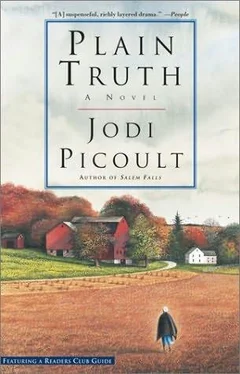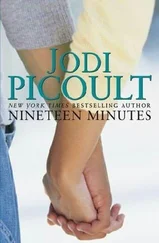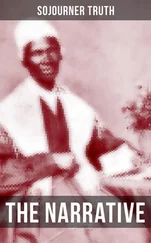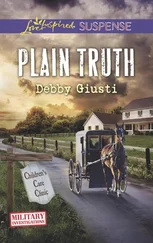“Hey,” I said gently, touching her shoulder.
She started, hurriedly wiping her face. “Ach, Ellie. I just came up here for . . . for . . . ”
“For a good cry. It’s all right, Sarah. I understand.”
“No.” She sniffed. “I have to get back to the house. Aaron will be coming in for lunch soon”
I forced her to meet my gaze. “I’m going to do my best to save her, you know.”
Sarah turned away, staring out at the neat, symmetrical fields. “I should never have put her on that train to see Jacob. . . . Aaron was right all along.”
“There was no way you could have known that Katie would meet an English boy and get pregnant.”
“Couldn’t I?” Sarah said softly. “This is all my fault.”
My heart went out to the woman. “She might have chosen to go on her own. It might have happened anyway.”
Sarah shook her head. “I love my children. I love them, and look what’s happened.”
Without hesitation, I embraced her. I could hear her words, hot against my collarbone. “I’m her mother, Ellie. I’m supposed to fix it. But I can’t.”
I took a deep breath. “Then I’ll have to.”
Getting to the trial was an exercise in politics. Leda and Coop and Jacob all arrived at the farm at about 6:30 A.M., each in a separate car. Katie and Samuel and Sarah were immediately shuttled to Coop’s car, because he was the only driver who had not been excommunicated. Neither Jacob nor Leda felt comfortable leaving their car on Aaron Fisher’s property, so Leda had to follow Jacob back to her house to drop off his Honda before they returned to pick me up. We had almost reached the point where I was certain we were going to be late when Aaron strode out of the barn, his eyes fixed on the passengers in Coop’s car.
He’d made it clear that he would not attend the trial. Although the bishop would surely have understood Aaron’s involvement in this particular lawsuit, Aaron could not condone it himself. But maybe there was more to him than I’d thought. Even if his principles kept him from accompanying his daughter to her trial, he would not let her go without a proper good-bye. Coop unrolled the back window so that Aaron could stick his head inside and speak to Katie.
But when he leaned close, all he said, softly, was, “Sarah, komm.”
With downcast eyes, Katie’s mother squeezed her hand and then slipped from the car. She fell into place beside her husband, her eyes bright with tears that she did not let fall even as her husband turned her by the shoulders and led her back to the house.
Leda was the first one to notice the vans. Sprawled across the parking lot of the superior court, they were crowned with satellite dishes and emblazoned with an alphabet soup of station call letters. Closer to the court-house was one row of reporters holding microphones and another row of cameramen rolling tape, facing each other as if they were getting ready to do the Virginia reel instead of comment on the fate of a young girl.
“What on earth?” Leda breathed.
“That’s debatable,” I muttered. “Reporters aren’t a human life form.”
Suddenly Coop’s face appeared at my window. “What are they doing here? I thought you won that motion.”
“I got the cameras removed from the courtroom itself,” I said. “Outside is anybody’s turf.” Since the day the judge had ruled, I hadn’t given much thought to the media issue-I’d been too busy trying to create a new defense. But it was naïve to think that just because the cameras would not be present meant that the interest in the story would likewise absent itself. I grabbed my briefcase and got out of the car, knowing that I had about two minutes before everyone realized who I was. Tapping on the rear window of Coop’s car, I pulled Katie’s attention from the knot of press.
“Come on,” I said. “It’s now or never.”
“But-”
“There’s no other way, Katie. Somehow we’re going to have to break right through them to walk up the steps to the courthouse. I know it’s not what you want, and it’s certainly not what I want, but we don’t have a choice.”
Katie closed her eyes briefly before getting out of the car. Praying, I realized, and I wished in vain that she were asking God to make them all come down with a plague. Then, with a grace that belied her age, Katie stepped out and put her hand into mine.
Awareness rolled like a tidal wave as one reporter after another caught sight of Katie’s kapp and apron. Cameras swiveled; questions fell around our feet like javelins. I could feel her wince at each flash; and I thought of Dorian Gray’s portrait, the life draining out. Bewildered, she kept her face tucked down and trusted me to lead her up the stairs. “No comment,” I shouted, parting the reporters like the prow of a great ship, pulling Katie in my wake.
I knew the building well enough after several visits, so I immediately took Katie to the nearest ladies’ room. Checking beneath the stalls to make sure they were empty, I leaned against the door to prevent anyone else coming in. “You’re all right?”
She was shaking, and her eyes were wide with confusion, but she nodded. “Ja. It just wasn’t what I expected.”
It wasn’t what I had expected either, and I had an obligation to tell her that it was going to get significantly worse before it got better, but instead I took a deep breath and managed to taste, deep in my lungs, the scent of Katie’s fear. Shoving her out of the way, I ran for the nearest stall and threw up until there was nothing left in my stomach.
On my knees, with my face fired and hot, I pressed my forehead against the cool fiberglass wall of the stall. It was only by taking shallow breaths that I managed to turn and rip off a piece of toilet paper to wipe my mouth.
Katie’s hand fell like a question on my shoulder. “Ellie, are you all right?”
Nerves, I thought, but I wasn’t about to admit that to my own client. “Must have been something I ate,” I said, tossing Katie my brightest smile and getting to my feet. “Now. Shall we go?”
Katie kept running her hands over the smooth, polished wood of the defense table. There were places the finish had been rubbed raw, worn by the hands of endless defendants who’d sat in the very same place. How many of them, I wondered, had truly been innocent?
Courtrooms, before the fact of a trial, were not the bastions of serenity depicted on TV shows about the law. Instead, they were a bustle: the clerk shuffling for the right file, the bailiff blowing his nose in a spotted handkerchief, the people in the gallery talking headlines over Styrofoam cups of coffee. Today it was even louder than usual, and I could make out distinct sentences through the general buzz. Most involved Katie, who was on display just as surely as a zoo animal, removed from her natural habitat for the curiosity of others.
“Katie,” I said softly, and she jumped a foot.
“How come they haven’t started yet?”
“It’s still early.” Now her hands were tucked beneath her apron, her eyes darting over the activity in the front of the courtroom. Her gaze lit upon George Callahan, six feet away at the prosecutor’s table.
“He looks kind,” she mused.
“He won’t be. His job is to get the jury to believe all the bad things he’s going to say about you.” I hesitated, then decided in Katie’s case, it would be best to know what’s coming. “It’s going to be hard for you to hear, Katie.”
“Why?”
I blinked at her. “Why will it be hard?”
“No. Why will he lie about me? Why would the jury believe him and not me?”
I thought about the rules of forensic evidence, the distinctions between casting a motive and spinning a false tale, the psychometric profiles that had been written on juries-all idiosyncrasies that Katie would not understand. How did one explain to an Amish girl that in a trial, it often came down to who had the best story? “It’s the way the legal system works in the English world,” I said. “It’s part of the game.”
Читать дальше












